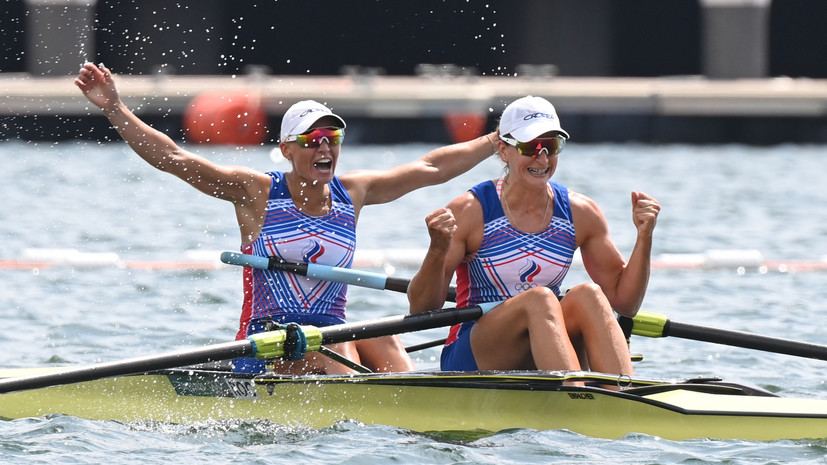The sixth day of the Summer Olympic Games in Tokyo began with a deafening sensation for the Russian team.
In the women's doubles competition in rowing, Vasilisa Stepanova and Elena Oryabinskaya won silver medals.
This is the first Russian medal in this sport in 17 years, and specifically in this discipline - the first in its entire 45-year history.
Rowing has been one of the most problematic sports in Russia since 2004, when the men's four of the doubles won the Athens Olympics under the immortal commentary of Dmitry Guberniev. Suffice it to say that only three boats were able to compete at the next Games, and in 2012 - two at all. In 2016, six crews have already passed the selection, but only one competed. In the rest of the events, athletes have been suspended based on the recently released McLaren report. The Olympics in Tokyo were not without doping scandals - at the last moment they had to refuse to compete in the top four due to positive tests for meldonium.
Of course, the medal prospects of Russian rowers all this time were completely bleak. After the bronze in the women's double at the 2005 World Championships, there was a lull that lasted 12 years. Only in 2017 and 2018 were the four women ranked third. In both cases, the crew included a Moscow rower Elena Oryabinskaya. But the Russians did not qualify for the Olympics in this class. Only teaming up with Vasilisa Stepanova, representing the Rostov city of Salsk, helped to perform at the Games.
However, it cannot be said that in Tokyo they did not expect medals from the rowers at all.
The Russian team has Anna Prakaten, performing in the women's singles.
Before the Games, she gained excellent shape and won the European Championship along with the prestigious World Cup in Lucerne.
The final will take place on July 30, and it was on this day that rowing fans were going to wait for a breakthrough.
But ahead of time, it was Stepanova and Oryabinskaya who managed to please.
Even in the preliminary race, they pleasantly surprised when they snatched second place from the main favorites - British women Helen Glover, who resumed her career for the third gold, and Polly Swann.
Although it was enough for the Russian women to enter the top three, they still snatched 0.59 seconds from their rivals.
Getting to the semifinals was already a local success, but Stepanova and Oryabinskaya went further and made their way to the main race.
Among the six crews, they showed a total fifth time, but they lost more than two seconds only to New Zealanders Grace Prendergast and Kerry Goler, who showed the highest world achievement (rowing records are not fixed).
It became clear that there are chances for a medal in the women's double, they just need to be used.
Early in the morning of July 29, Stepanova and Oryabinskaya went to the start of the final race.
Already at the beginning of the race, the leading four was formed, from which the Greek and Spanish women fell out.
The Russian girls went slightly behind the British, and the New Zealanders and Canada, the gold and bronze medalists of the last world championship, took the fight for first place.
By the middle of the distance, Prendergast and Gowler took the lead, and the Russians caught up with the British girls.
Glover and Swann could not stand the given pace and nevertheless let Stepanova and Oryabinskaya go ahead. A place in the top three was already secured for them, but in the last 500 meters, the speed began to drop for the Canadian Kaylee Filmer and Hillary Jensens. The Russians walked excellently, without any hint of fatigue. Already before the finish, they took second place and won 0.65 seconds over the North Americans. The crew from New Zealand celebrated the victory.
The silver race of Stepanova and Oryabinskaya can rightfully be considered the most unexpected achievement of Russian athletes at the Tokyo Olympics. Even the entry of basketball players to the final can hardly be compared with this. The two Russian women not only won the first medal in rowing since 2004 - no one has shown such results in women's competitions since 1988, and specifically, there have never been any medals in the double, although this discipline has been present in the program of the Olympic Games since 1976. It was difficult for the athletes to hide their joy after such success.
“It's hard to believe in this, to realize!
We are very happy!
At the Olympic Games, everyone is very strong, and all the crews go from the start with maximum speed.
We also walked as much as possible, just at some point we realized that we still had a lot of strength and we had to give our best.
We didn't get to the gold a little bit, but we gave our all today to the fullest, ”said Oryabinskaya.
Prakaten will have the opportunity to interrupt the already losing streak of Russian rowers.
On the same day, she won her semi-final with a second time, losing only to the winner of another race, Emma Twigg from New Zealand.
Alexander Vyazovkin also reached the final with the fourth result, who, like Oryabinskaya and Stepanova, managed to come close to the other participants.

